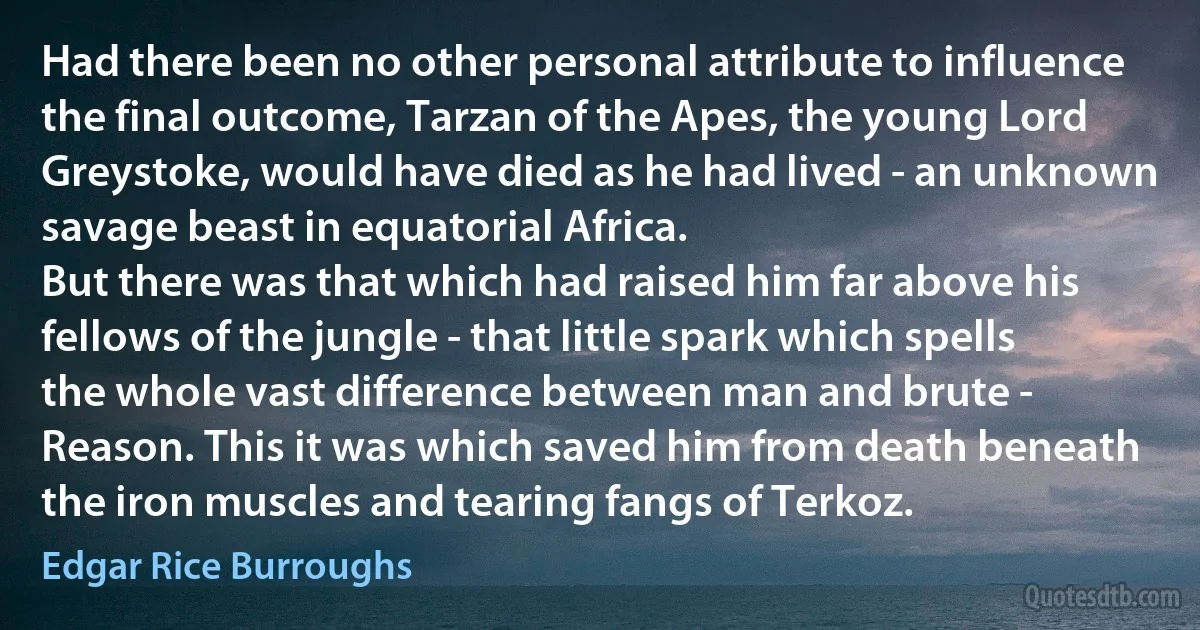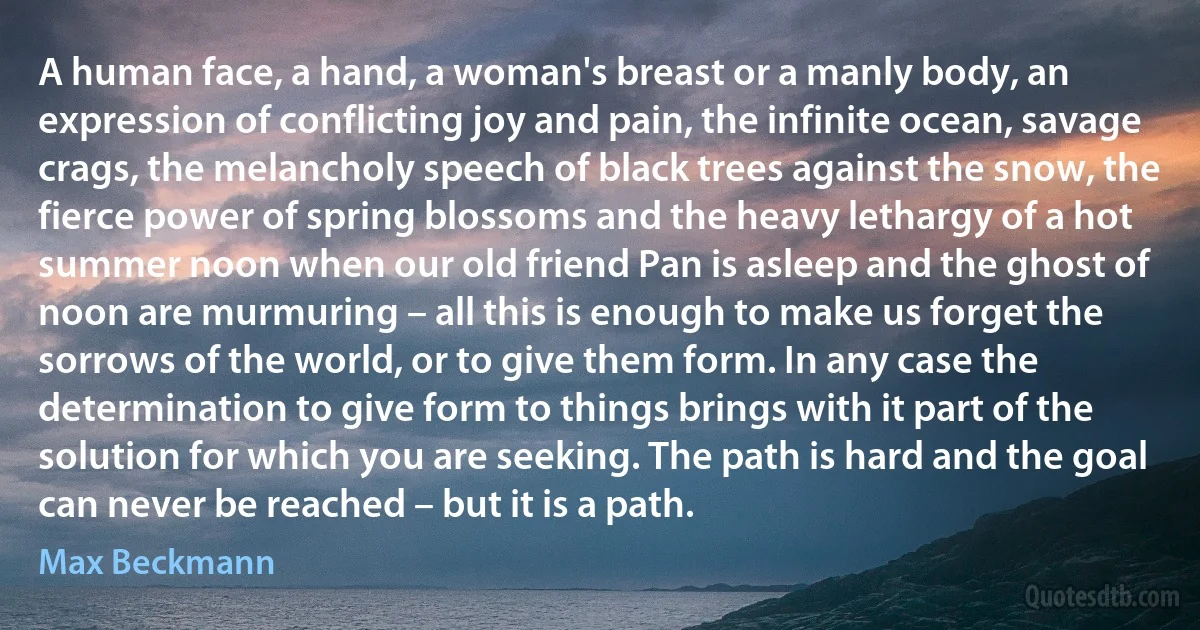Savage Quotes - page 5
..I saw Gauguin; he told me his theories about art and assured me that the young [artists] would find salvation by replenishing themselves at remote and savage sources. I told him that this art did not belong to him, that he was a civilized man and hence it was his function to show us harmonious things. We parted, each unconvinced. Gauguin is certainly not without talent, but how difficult it is for him to find his own way! He is always poaching on someone's ground; now he is pillaging the savages of Oceania.

Camille Pissarro
Of all the discoveries which men need to make, the most important, at the present moment, is that of the self-forming power treasured up in themselves. They little suspect its extent, as little as the savage apprehends the energy which the mind is created to exert on the material world.

William Ellery Channing
Thus, at eighteen, we find him, an English lordling, who could speak no English, and yet who could read and write his native language. Never had he seen a human being other than himself, for the little area traversed by his tribe was watered by no greater river to bring down the savage natives of the interior.
High hills shut it off on three sides, the ocean on the fourth. It was alive with lions and leopards and poisonous snakes. Its untouched mazes of matted jungle had as yet invited no hardy pioneer from the human beasts beyond its frontier.

Edgar Rice Burroughs
Tarzan of the Apes, young and savage beast of the jungle, wondered at the cruel brutality of his own kind.
Sheeta, the leopard, alone of all the jungle folk, tortured his prey. The ethics of all the others meted a quick and merciful death to their victims.
Tarzan had learned from his books but scattered fragments of the ways of human beings.

Edgar Rice Burroughs
Tarzan was an interested spectator. His desire to kill burned fiercely in his wild breast, but his desire to learn was even greater. He would follow this savage creature for a while and know from whence he came. He could kill him at his leisure later, when the bow and deadly arrows were laid aside.

Edgar Rice Burroughs
On the dust of our heroic ancestors we too sit ballot-boxing, saying to one another, It is well, it is well! By inheritance of their noble struggles, we have been permitted to sit slothful so long. By noble toil, not by shallow laughter and vain talk, they made this English Existence from a savage forest into an arable inhabitable field for us; and we, idly dreaming it would grow spontaneous crops forever,-find it now in too questionable a state.

Thomas Carlyle
In primitive society the rules of ceremonial purity observed by divine kings, chiefs, and priests agree in many respects with the rules observed by homicides, mourners, women in childbed, girls at puberty, hunters and fishermen, and so on. To us these various classes of persons appear to differ totally in character and condition; some of them we should call holy, others we might pronounce unclean and polluted. But the savage makes no such moral distinction between them; the conceptions of holiness and pollution are not yet differentiated in his mind. To him the common feature of all these persons is that they are dangerous and in danger, and the danger in which they stand and to which they expose others is what we should call spiritual or ghostly, and therefore imaginary. The danger, however, is not less real because it is imaginary; imagination acts upon man as really does gravitation, and may kill him as certainly as a dose of prussic acid.

James Frazer
Diogenes, in his mud-covered sandals, tramps over the carpets of Aristippus. The cynic pullulated at every corner, and in the highest places. This cynic did nothing but saboter the civilisation of the time. He was the nihilist of Hellenism. He created nothing, he made nothing. His role was to undo - or rather to attempt to undo, for he did not succeed in his purpose. The cynic, a parasite of civilisation, lives by denying it, for the very reason that he is convinced that it will not fail. What would become of the cynic among a savage people where everyone, naturally and quite seriously, fulfils what the cynic farcically considers to be his personal role?

José Ortega y Gasset
Remember the rights of the savage, as we call him. Remember that the happiness of his humble home, remember that the sanctity of life in the hill villages of Afghanistan among the winter snows, are as sacred in the eye of Almighty God as are your own. Remember that He who has united you together as human beings in the same flesh and blood, has bound you by the law of mutual love, that that mutual love is not limited by the shores of this island, is not limited by the boundaries of Christian civilisation, that it passes over the whole surface of the earth, and embraces the meanest along with the greatest in its wide scope.

William Ewart Gladstone
Nothing is more delightful than to confuse and upset people. People one doesn't like. What's the use of giving them explanations that are merely food for curiosity? The truth is that people love nothing but themselves and their little possessions, their income, their dog. This state of affairs derives from a false conception of property. If one is poor in spirit, one possesses a sure and indomitable intelligence, a savage logic, a point of view that can not be shaken. Try to be empty and fill your brain cells with a petty happiness. Always destroy what you have in you. On random walks..

Tristan Tzara
Art has not the celestial and universal value that people like to attribute to it. Life is far more interesting. Dada knows the correct measure that should be given to art: with subtle, perfidious methods, Dada introduces it into daily life. And vice versa. In art, Dada reduces everything to an initial simplicity, growing always more relative. It mingles its caprices with the chaotic wind of creation and the barbaric dances of savage tribes. It wants logic reduced to a personal minimum.

Tristan Tzara
The Occidental man is not so bad... Not bad at all, the brave Aryan [inhabitant of the Saraha]... I'm not unhappy to be living with him again.... one need not go outside of Europe in order to find truly "savage" individuals... These savage values to which I attribute more value than all others, appear to show themselves, in our worlds of Europe and America, more forcefully and tempestuously than in all other worlds..

Jean Dubuffet
There was very little that prevented the vandalism of 1793 from suddenly producing a second revolution as marvelous as the first was horrible. The whole human race was approaching its release; the civilized, barbarian, and savage order would have disappeared forever if the Convention, which trampled down all prejudices, had not bowed down before the only one that had to be destroyed, the institution of marriage.

Charles Fourier



